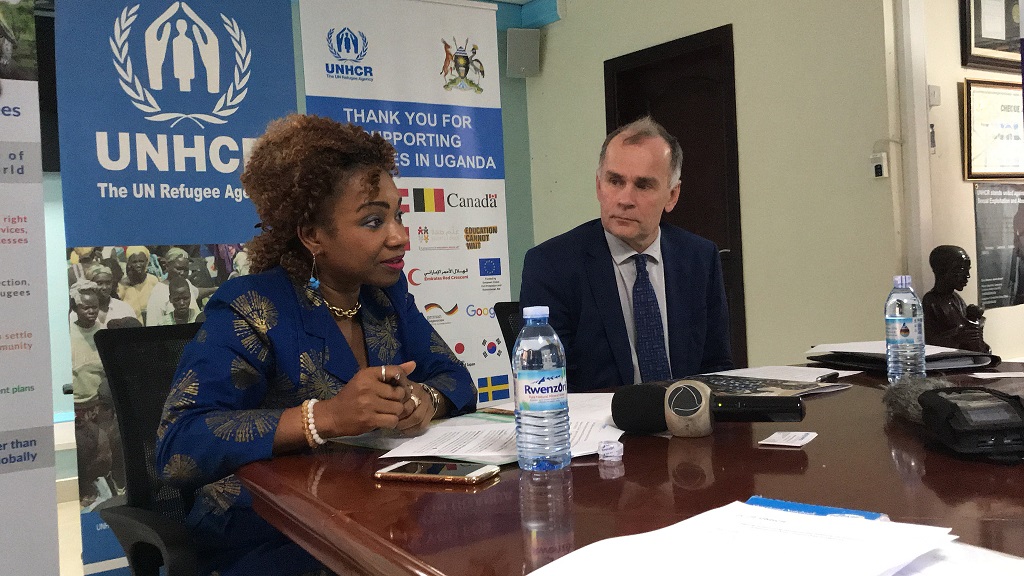
KAMPALA – The Swedish International Development Cooperation Agency (Sida), United Nations High Commissioner for Refugees (UNHCR), and the Grameen Crédit Agricole Foundation (GCAF) today launched a four-year programme to promote access to financial and non-financial services for refugees and host communities in Uganda.
The programme is an innovative blended financial approach with public and private funds coming together to facilitate finance for refugees and host communities. Access to affordable credit services is essential for refugees to start, build and expand enterprises, to meet their daily needs and to be more resilient to emergencies. In addition, access to other types of financial services such as savings, payments and insurance is key to ensure the inclusion of refugees in the formal financial sector and promote their self-reliance and resilience.
This is a first-of-its-kind programme designed to incentivize both microfinance investors and financial service providers (FSPs) to extend their financial services to refugee and host populations.
The project is currently piloted in Palorinya refugee settlement, in northern Uganda and in Kampala and will be gradually expanded to other targeted refugee-hosting districts.
 “We believe refugees have a lot of untapped capacity that can be realized by giving them access to credit for business activities,” says Ola Hällgren, Head of Development Cooperation at the Embassy of Sweden in Kampala. “This will be critical to support start-ups and facilitate employment.”
“We believe refugees have a lot of untapped capacity that can be realized by giving them access to credit for business activities,” says Ola Hällgren, Head of Development Cooperation at the Embassy of Sweden in Kampala. “This will be critical to support start-ups and facilitate employment.”
Uganda’s progressive refugee policy favors inclusion of refugees into the national development plans, however, limited employment opportunities for most of the refugees remains a big challenge. Refugees generally lack access to formal financial services, mainly due to the lack of awareness by FSPs of the business potential to serving them. The financial needs of refugees are significant and access to financing for income-generating activities can contribute largely to their social and economic inclusion in the host country.
GCAF will provide debt funding to three FSPs with a guarantee from Sida, which will also fund the technical assistance of the programme through its humanitarian allocation. The Foundation will coordinate, together with UNHCR, the technical assistance component in order to support the three FSPs to develop an offer of products and services, including financial literacy and business development trainings, for both refugees and members of the host communities
For UNHCR, the project is in line with the Comprehensive Refugee Response Framework (CRRF) and respond to the call to work with development agencies and the private sector to find lasting solutions for refugees. Many refugees are entrepreneurs, having been business owners in their country of origin or having entrepreneurial skills to start or expand business activity in their host country.
UNHCR Deputy Representative in Uganda, Mahoua Parums hailed the initiative and reiterated UNHCR’s commitment to continue advocate with donors and partners to support refugee entrepreneurs and business owners to develop new livelihoods or re-start enterprises while in exile.

Ms. Parums said: “Financial inclusion is a key component of achieving long-term solutions for refugees, as it helps them rebuild sustainable livelihoods. Many refugees decide to start a business once they settle in the country of asylum and microfinance can help them make their business grow, avoid aid-dependency and contribute economically and socially to the host communities.”
Through this programme, refugees will receive entrepreneurial training, equipping them with essential skills such as business plan development, financial literacy (including working with the banks), pricing and marketing.
“At the Foundation, we are convinced that microfinance institutions, while adapting their products and services, have an active role to play in promoting the financial inclusion of refugees. Opportunities for digital finance, an in-depth knowledge of each group’s characteristics, regular follow-up and appropriate non-financial services should stimulate such an involvement.” Says GCAF’s Managing Director, Eric Campos.
In total, some 100,000 refugees and hosting Ugandans would be able to access financial services (credit and savings) 70 percent being women. The project will support the creation and development of small businesses such as farming, handicrafts, catering, and trading.





